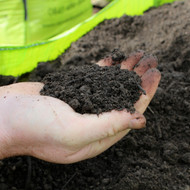Soil and compost for a school vegetable garden
The soil or compost you use in your school vegetable garden is the single most important part of the project. Vegetables are demanding as plants go, after all we we expect quick growth and lots of crops from a relatively small space. Flowering plants and shrubs can produce year after year on a less fertile soil because we don't harvest them and remove nutrients from the soil. Vegetables are different, they take a lot nutrients from the soil to grow but these nutrients are never returned to the soil because we pick and eat the plant.
The secret to a successful school vegetable garden really is in the soil, it contains the food the plant needs to grow. A poor soil simply cannot produce a good crops, it's as simple as that. It's important to make sure the soil you use is of suffient quality and should be an important part of the budget.

A word on Compost The term 'Compost' can be a little confusing for new growers as it's a word used for two quite different things. The bags of compost you see in garden centers or hardware shops are usually peat based and are a sterile growing medium for growing plants. Sterile means peat or peat substitutes don't contain any nutrients, they are just a nice fine textured medium for the plant roots to grow. All multipurpose compost have nutrients added to them which will typically only last about a month. After this you will need to supplement the plant with extra feed.
The compost we make in our garden by rotting down vegetable waste in a compost bin is a very different thing. Well composted waste may look similar as it's dark and crumbly but this is a highly nutritious plant feed suitable for mixing with garden soil to increase fertility. Garden compost would be too rich for use on it's own and should be added to beds as a mulch or dug into top few inches of your soil.
I will refer to low nutrient compost as 'Multipurpose' compost and nutrient rich compost as 'Garden' compost.

Multipurpose Compost Multipurpose compost is a handy bagged product suitable for smaller container growing. Multipurpose compost is available as a traditional peat based product or as a peat free alternative. Peat is slowly being phased out as peat mining or harvesting destroys the peat bogs which are an important and valuable habitat. We supply a reduced peat compost or a peat free alternative.
Multipurpose compost is suitable for smaller containers as smaller quantities of soil will dry out too quickly and generally will not contain enough nutrients to sustain the plant. As I explained in the compost section multipurpose compost, whether peat or peat free, will only contain enough nutrients to feed the plant for a month. We recommend adding a natural seaweed/poultry manure pellet feed which will slowly release nutrients for up to 3 months. Pellet feed can be mixed into the compost at planting time or gently worked into the surface of the soil when required.
Multipurpose compost is suitable for the following planters:
Carrot patio planter Hanging Strawberry Growbag Potato Patio Planters Herb and Strawberry Planters Pea and Bean Planter Rail Balcony Planter Self Watering Window Box Planter

Municipal 'Garden' compost. Compost produced in your school compost bins is excellent stuff and a sensible and sustainable way of feeding your school vegetable garden. The problem is you can will never be able to make enough of it as the majority of material grown in the garden will be removed and eaten and therefore never returns to the soil. To keep a soil wed fed you will need to substitute nutrients from an outside source using compost or manure.
Municipal compost is more suitable as a soil improver and should be added to larger, more permanent beds a mulch in the springtime or a soil improver and nutrient booster when filling the beds for the first time. If you are building a school vegetable garden using your own supply of topsoil municipal is highly recommended to mix in with the soil to improve soil structure and nutrient levels.
Envirogrind is available in the following size bags:

Quickcrop topsoil/compost mix We deliver cubic metre or tonne bags of soil mixes for filling larger 6ft by 4ft beds. We have a specially formulated vegetable soil mix that includes a high quality topsoil base mixed with 30% garden compost mix. The topsoil has been screened to remove any large stones but does contain some small pea gravel or pebbles to aid drainage. The compost mix adds nutrients and ensures the soil is light and easy to work. Our soil mix will contain sufficient nutrients for the year with an application of envirogrind recommended the following Spring.
Our 6ft by 3ft timber raised vegetable beds will hold approximately 1 x tonne (cubic metre) bag of soil mix with some left over to refill the beds when the soil naturally settles after a month or two.
Our topsoil mix is not suitable for smaller planters but is the perfect choice for filling large raised beds.

